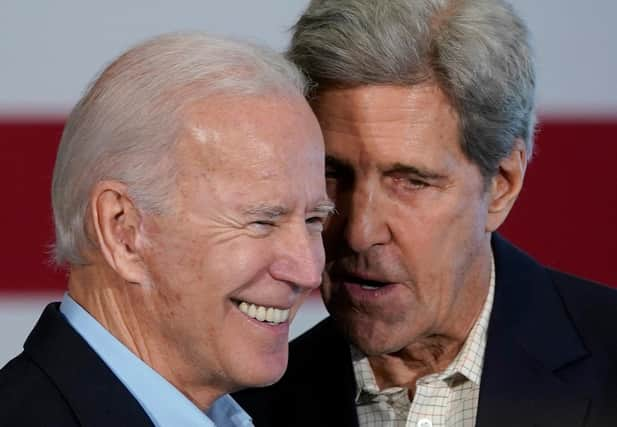Climate change: Joe Biden and John Kerry show the optimism of their post-war youth as they spur the world to action – Joyce McMillan


Kerry is an interesting figure, perhaps one of the most distinguished presidents America never had. He was the losing Democratic candidate in the post-9/11 presidential election of 2004; and as a US Senator for almost 30 years, until 2013, he is not likely to be any kind of political angel.
Yet as Barack Obama’s Secretary of State from 2012 to 2016, he became fully persuaded of the need for urgent action on climate change, and signed the 2015 Paris Agreement on behalf of the United States, reacting with some fury when Donald Trump’s administration withdrew from the agreement two years later.
Advertisement
Hide AdAdvertisement
Hide AdKerry is now involved in intense diplomatic and political preparations for November’s Cop26 summit in Glasgow, which he says must mark a decisive moment in tackling the climate challenge; but it was striking that in opening his speech at Kew, John Kerry began not by listing this week’s obvious climate-related disasters, but by evoking the history of his generation, the last to be able to recall what social breakdown and chaos looked like, across part of the western world.
Now aged 77 – just a year younger than President Biden – Kerry conjured up his earliest childhood memory, of his mother taking him to France, in 1947, to revisit the ruin of her family’s house, burned out by advancing German troops during the Second World War.
The memory has stayed with him all his life, he said, along with an appreciation of the huge collective international effort it took, in the aftermath of war, to stabilise a world torn apart, and to rebuild and heal.
And if ever we needed a reminder that the world may now once again need a collective effort on that scale, these past few weeks have surely provided it, as region after region of our struggling planet has reported unprecedented floods, heatwaves and wildfires.
Even Edinburgh suffered its own relatively minor flash-floods two Sundays ago; and every news bulletin provides ample evidence of unprecedented and lethal weather conditions elsewhere, as terrifying floods ravage Germany and China, heatwaves suffocate previously temperate regions, and wildfires rampage through dried-out forests from Siberia to the Amazon.
Climate change, in other words, is already both real and irreversible; and the only question is whether we can limit it to a scale that will enable our civilisation to cope, and to survive.
Yet what was striking about Kerry’s speech was the extent to which he succeeded in combining a sobering and frightening reality check on the scale of the problem, with a serious and optimistic practical determination to move the international community onto the emergency footing that will be necessary, if the challenge is to be met.
Most of the brief broadcast news reports on Kerry’s speech somehow succeeded in suggesting that his main purpose was to attack China – now the world’s largest carbon emitter – for not committing to a faster reduction in its own carbon footprint.
Advertisement
Hide AdAdvertisement
Hide AdIn fact, though, the position he was taking was almost the reverse; as he fully acknowledged the US’s role and obligations as by far the world’s greatest historic carbon emitter, and signalled that whatever the US’s problems with China might be, the world has now passed the point where anyone can afford to pick and choose which allies they will include in climate agreements, or under what conditions they will join them.
Just as Britain and the United States allied with the USSR to defeat Nazism, so strong co-operation with China will be necessary to avert catastrophic climate change, as will serious climate action from developing countries who arguably have done little or nothing to cause the crisis; and any countries or individuals who still think they can still play diplomatic games of “not fair” and “not if he’s playing” around the climate issue, are simply failing the coming generations, with catastrophic consequences.
What Kerry is trying to do, in other words, is to form a decisive alliance between his generation, with their positive memories of postwar recovery and successful institution-building, and the teenage “school strike” generation who – with rage and despair – truly grasp the urgency of the emergency.
Kerry frames the crisis as a test of the capacity of our institutions, and expresses his faith that they can rise to the challenge, if they choose. Above all, he recognises the optimistic truth that most of the technology we need to end carbon emissions by 2050 already exists, and is rapidly evolving; and he sees the scale of the opportunity for green investment, development and employment that the transition could create, once all the forces of government, commerce, and wider society swing their support behind it.
Once, decades ago, the British writer Ian McEwan posed the question, “Shall there be womanly times, or shall we die?”, suggesting that aggressive and hyper-competitive male behaviour was driving the world towards destruction.
Joe Biden in the White House, though, and John Kerry as his climate envoy, seem to be seeking to show that grandfatherly times can also have their uses; and that old men who remember the lessons of the past, and who care deeply for the future of their children and grandchildren rather than wanting to tear the world down with them as they go, may finally be the ones to galvanise the world into action on the defining crisis of our time, where all else – so far – has failed.
A message from the Editor:
Thank you for reading this article. We're more reliant on your support than ever as the shift in consumer habits brought about by coronavirus impacts our advertisers.
If you haven't already, please consider supporting our trusted, fact-checked journalism by taking out a digital subscription.
Comments
Want to join the conversation? Please or to comment on this article.
